Episode 2
Brendon Nikolajew
RAA Gunner
“I joined the Army in 2008 as an RAA Gunner.
I was one of 7 Gunners selected as part of a 15 man contingency sent to England in February 2010 to train with the British Airborne Royal Horse Artillery for 7 months and deployed to Helmand Province in Afghanistan in the same year.
To be a Gunner and do this job in a war, was an experience very hard to explain sometimes. The men I fought beside and trained with prior to the deployment are brothers by choice and i’ll always have the highest of respect for each one of them. I’m glad I got the opportunity and i’d do it all again. We returned home in April 2011, 14 months in total away from home.”
Speaker 1: I'm Steve price. I'm proud to be an Australian ambassador for wounded heroes, the first responders to our homeless and at risk veterans providing emergency solutions right across Australia. They're starting to sell furniture and they're starting to sell engagement rings. They're Hawking their metals. They're Hocking their PlayStations for their kids to keep a roof over their head. Every day, year round wounded heroes provides these emergency solutions with no government funding. We just noticed there was a need for that immediacy of crisis funds, immediacy of being able to operate within one hour, 10 minutes, 15 minutes to get food on the table with Tricity to get some rent pies. They're not being evicted. And they saved my life now and they work tirelessly seven days a week without any help. No they're running on the smell of an oily rag and then they get there on the farm heroes, wounded heroes just launched a new national campaign to recognize Australian military veterans veteran of the day. We're calling it. I'm Steve price. I'm a proud wounded heroes ambassador, and I'll talk weekly with our wounded heroes veteran. Now, today we look at the story of render Nikolai. Brendan is currently undergoing treatment for very serious bout of cancer, started with testicular cancer and Brendan joined the Australian army as a 17 year old and trained as a gunner random welcome to veteran of the day. How's your health at the moment?
Speaker 2: Um, it's definitely not a fantastic position of pain, um, to be able to lead, um, a neutral from the front, um, being the first human to actually have these toxic drugs. Um, it's pretty incredible. Um, probably one day can help people in my position who were, who were battling cancer actually, cause they eat it without having to use something as hard as chemotherapy straight away.
Speaker 1: We're going to talk about that treatment in a moment, but I want to talk about your time in the Australian army. I mean, you, you joined with the ambition to become a Ghana and you're trained as a gunner. You were 17 years old when you joined.
Speaker 2: Yeah. Was seven eight when I joined it's a very young age and had a few mates who were seven, eight at the time, um, who also joined with, um, and we would have put our paperwork in when we're probably about 16, nine months. Um, it's pretty crazy. You don't really understand the decision making when you're that age. You just, you just have this drive and I dunno what it is. It's just that Australian Patriots season to go. I want to do something that not only selfish like for your country and it's, it's a big adventure and you thought through it, it's an amazing thing to be able to do. Did you go to school? I went to school in a small Catholic college standing style, um, in Victoria. And, um, so that was, yeah, that was awesome. And I left when I was about halfway through year 11, I thought I was probably joking. I didn't understand what I was going to do. Um, and then a year and a half flight, I was in the middle of Afghanistan. So that's pretty, pretty crazy. Hey, you can go from one extreme to another, as a young buck there.
Speaker 1: Well, I think in my children, my own children at that age, I mean, they could barely find their way to school and we didn't trust them to get on a bus and you're, you're joining the army, but why the army Brendan,
Speaker 2: I honestly wanted to do something different, a unique, odd personally, never known anyone who'd been in the army from my hometown. Um, and I joined, um, for that whole reason, I just love the Australia. I love the Anzac spirit, a lot of, a lot of the custodianship that we had and even learning from it through school, I was just always wanted to do different and, and seek that adventure and, and, and become a soldier from a young age when you were a kid, I guess they forgot. What do you want to be? You you'd say their place. Also email want to be a falafel. I don't also, I always wanted to be a soldier and stands a little bit cliche, but I've got that opportunity and I'll never look back on it.
Speaker 2: We went to Caprica first, obviously. And then after that to do gun course went to pocket. Um, yeah, I mean, I'm North, I would say more down there and after that I would buy stuff in Brisbane. Um, and just kind of, I don't know how to explain it, but I had the best group to try to get us to a point where I was one of 15 selected to go to England to then go to, um, trying to it's a pretty shape on to then go to Afghanistan. And I just had the best group of blacks around me. They all wanted to see each other be there because being able to do artillery for real and actually do that job role in Theda in an operational theater, you shopping surreal. And I think that's every soldier. You always sit through day job
Speaker 1: In 2008 and by 2010 year in the UK, we'll get to that in a moment. You were first regiment gunner of the year in 2009, explain to those listening to our wounded heroes veteran of the week podcast. Um, you, how did you get into being a gunner and what does that entail?
Speaker 2: Yeah, so when I joined, uh, you, firstly you do it, you do it where you get a load of testing done and you basically get a range of jobs given to. And one of the jobs that came up for me was Ghana and I never wanted to join the army and be a truck driver. I didn't want to join to be a builder because I could have done that normally. Um, I wanted to do something that was just out of the ordinary, something that you would never get to do, um, into doing straight. Um, and Donna just popped the up to me because I was a young boy, very impressionable. Um, but once I learned what it was, um, and becoming a gun number, um, it was, it was on Ru before I bombed at Y anyway from 15 to 30, 40 kilos. I'm like, it's not imaginable. And being that young and being able to get into a job like that, that's where I ended up. I was, I was proud as punch. I couldn't be more proud of the job I got to brew as well.
Speaker 1: What's the particular skill. Brandon, you need to be a good guy.
Speaker 2: Basically. It's a very attitude. Um, it's basically the fact that you're there to do the work, the hard yards to make the job easier, but you gotta be good. Initially we were on the one, one nine, and basically it's all about teamwork. It's never about you. It's all about making sure that as a unit, you together getting the bombs down range as fast as possible, because the reason you're firing a gun, I'm not Hilary again, because they've gone off the other end under her knee and bones coming in for bicycle. They walk, we'll get him out of the, out of the shift. Really.
Speaker 1: So 15 of you get chosen to go to Britain and you go and train with the British airborne Royal horse artillery. I imagine they must have an incredible history.
Speaker 2: Their history is something else. And I, uh, I well unbelievable to work with. Um, probably the British empire is something absolutely incredible. And even calling dance to the museums that I had over there was just something else. Um, in comparison to having Canberra for us and the woman working on their thing, what been in their history and their Aqua, it was pretty surreal. And to be a part of something like that, to try and with them, um, and even side that we were part of that was, was a pretty amazing feeling. Um, but at the same time when we got there, we were already trained in Australia to be ready for water or to be ready to fall off. So when we go to England, when I would just pretty much ramping up there on trying to get into a theater. So we're there for about six to seven months prior to going to Afghanistan. Um, so we were already at a very elite fitness level, um, job readiness level to go to war. So when we got there, it was pretty awesome to pretty much acquisition had good news Shailene, I mean, uh, with what we did. Um, and I'll always look back on that time and got it. [inaudible]
Speaker 2: good at what we did. And we would have brought people to get chosen, to go do what we did.
Speaker 1: I seem to hear that a lot, both comparisons between the Australian forces, uh, in particularly in places like Afghanistan comparisons with the U S forces and the UK forces. We are obviously, we've got a great history ourselves, military, but our training obviously in Australia must be pretty good.
Speaker 2: A hundred percent. I don't think it's at that more one on one time. I think the bigger the army, um, the less one Oh one chance you get with people who are skilled at certain job roles. I feel like I'm in Australia being a little bit smaller of a defense force, a smaller monogamy. You get more one on one. So on withdrew, you get one on one flooring and learning exactly how you need to authorize. Um, which is, which is actually probably the more numbers. It's not the cost. The more, the more people you have in a class, I guess the way someone could learn possibly because they're not going to ask the question or they're going to get out of the loop, whereas a smaller unit, you can actually get the training you made and you can actually operate in a better efficiency.
Speaker 1: You get trained up and they you're then deployed to the Hilman province in Afghanistan. As a, you joined at a 17 year old. You, you want to be at the sharp end of operations in the army. You don't want to be back home peeling onions in a kitchen, but how did you feel about when you, when you got told that you were actually going to use your training in a theater of war in a place like Afghanistan?
Speaker 2: Yes. That is an amazing question. Um, so I think one, if you're saying I was one of seven gig is a one to seven, so private equivalent, um, way, which we way with grilled, you know, weed wise, if that makes sense, we will wake up to exactly what we're trying for for real. Um, we knew the laid out training would be insane. It'd be brutal. Um, the latest, we had a kind of come on where we're exceptional. Um, we, we just knew that we had absolutely everything in the raw price at the right time, what we could do and to be that young, um, sort of even now thinking back to the people, when I look at a nine year old or an 18 year old, it is a little bit baffling and you've got this confidence that, you know, everything and you're the best. And you just have this overwhelming sense of confidence in your, um, your brothers. And, and it's just, it's incredible. The feeling was that feeling is being called that you were selected and you were good enough and you perform well enough to do something like that. And to go to England to basically represent Australia, it's a pretty amazing, like a very amazing feeling.
Speaker 1: I'm Steve price. I'm proud to be an Australian ambassador for wounded heroes, the first responders to our homeless and at risk veterans providing emergency solutions right across Australia every day, year round wounded heroes provides these emergency solutions with no government funding as a not-for-profit volunteer run organization. They use 100% of all public donations for this emergency accommodation to veterans and their families for food, electricity, and fuel for many veterans and their families. This is lifesaving assistance. The only hope you can help wounded heroes with this great cause by donating $8 on the eighth day of every month, an eight for a mate together, let's stop veteran homelessness and help raise funds for wounded heroes, visit wounded heroes.org.edu for details on eight for a mate. This is our veteran of the week. We're talking to Brendan Nikolai, uh, Brendan, you grow up pretty quickly. And in that circumstances, you describe your fellow soldiers that you were training with as your brothers. Uh, that that's a very strong term. I may explain that.
Speaker 2: So, um, the reason I call them brothers is because, um, when I would talk to my battle with cancer has been pretty in your face, but when you need, um, someone to talk to, you'll always have them. It's a thing it's, um, father's black choice. You've chosen to be there. You've chosen to become brothers and when you're training and when you're leading up to war, um, yeah, there's obviously a massive difference in rank, like a lot of the time, but when you're training for war, you become close to, you're trying to get together, like every waking minute for you to try to make sure that you'll never ever, ever going to let that person down. Um, and that's, that's something that you don't combine too many workplaces.
Speaker 1: You fly into Helmand province. What was it like?
Speaker 2: That was very hard grades. You do seven days, which is just fraught, baffling, hot, and it's dry heat. So it's not like that, like up here in Queensland where I am, it's not a humidity, it's just that dry hate. Like I remember just blood coming out of my nose cause it will be, um, swirling, wind and draw him and, uh, the locals when we get to Mason and when we get to have yours or anything like that. And, um, that's probably one of the biggest thing that sticks with me is when you just say a farmer, um, farming, um, any, or he's doing crop work or he's got his family, or they're fine.
Speaker 2: They are unfortunately in a, that is, has been riddled with conflict for so many, so many years. Um, that that's a very confronting thing. That's something I think would keep anybody up at night thinking about, um, it's just a lost all of that and it's not their choice on where they're born or anything like that. But, um, there's still laws that, um, the Taliban on the other hand, a very crew, um, very, very crew, um, what families had to do with probably dilate the threats I would've had to have gotten just from speaking to us, prepaying pro
Speaker 1: Our operations, they're obviously, uh, uh, designed to, to run the Taliban out of Afghanistan. It was it, did you get a sense that we were doing the right?
Speaker 2: So, um, one of the places where I was, um, was, and what had happened there is I bombs pretty regularly. Um, um, one of the things on notice was with bar, we bought a lot of bonds, um, stuff like that. And it was, we were basically pushing the Taliban so far back that we no longer needed this base. So after two months, two and a half months of being there, we started ripping it down because we pushed them back to a certain point where they were no longer in that area, which to me, that's, that's a small victory in the big scheme of things. The locals were going about their normal day, a lot better. Um, but it's just really, really, that's a very hard question because I think everybody wants to say they're winning or they've won, but just still say conflict either in that region, I feel for everybody has to deal with that sort of lost
Speaker 1: Brandon. You were pretty handy cricket. Did you get any chance to practice?
Speaker 2: Yeah, we did. We actually played a little ass series against the British, a lot of cricket. I was fortunate enough to maybe, um, Australian born and bred. Um, we ended up falling a little bit of bias, but I have to say I'm a ball. Um,
Speaker 1: So you go to Afghanistan as a youngster. You're, uh, you're doing the job that you've always wanted to do. Uh, the bigger battle for you though is the one you're currently going through right now. And I, I know you don't mind talking about it, but you know, you get diagnosed with testicular cancer. Did you ever get explained to you? How come you, why, what happened and how, how it came about
Speaker 2: No family history whatsoever? Um, I don't have any, um, any top, that's all I've been to a lot of debates. Um, there's nothing I could pinpoint to say. That's where I got it or that's the reason I'll go. Got it. Um, I suppose you could take your vital data. That's never going to help my situation. And unfortunately I I'm where I'm at now,
Speaker 1: There was a very famous NFL player, a guy who was diagnosed with testicular cancer after being flicked with a towel. So it's not that sort of, it didn't come from that story.
Speaker 2: Um, mom was a really, really good one. Um, you do an examination once a month. That's what that's what's recommended. Um, and I was literally just feeling, uh, and I felt a hard size pain on my left testicle, um, and straightaway system, common knowledge, or just, just knowing that that's not my normal, normal is a messy thing. Um, that wasn't one normal. And I went and got the checks right away. Um, or they had a CT scan and ultrasound and blood tests and it came back saying that, yeah, unfortunately I do have testicular cancer. Um, but it wasn't from a flick or anything like that. It wasn't from, um, something like that. There was no sort of, um, cause for it, if that's the best way to say it, it just unfortunately happened. And I found that lump, but it was very early on detected very early and often I did remove it. I think that's why I had the year without cancer because it didn't spread to anything size at that point. Um, and it was very fortunate.
Speaker 1: So you have your left testicle removed and then you're almost a year cancer-free. I can't imagine what it would be like when you go for that checkup and they say, listen, we're sorry, Brendan, but we think the cancer's back.
Speaker 2: Um, at the time, um, I had my daughter, Georgie, I'm a walkway. Um, anybody who knows me, I'm sort of not one cause too much or definitely unexplained crying or anything like that, but that brought me to tears and it didn't break me. I knew I had two babies. Um, I knew we had a lot of avenues to go down and I knew they weren't. Right. I knew what was going to therapy on you. It was going to be very harsh. Um, and so I'm blame Austin, which is a very harsh regime. My hair fell out off the, I think seven, nine guys, um, had prizes of neutropenia in that con um, anybody who has had to unfortunately go through that brutal of a protocol that is, but it got rid of all my cancer. Um, and for 98% of miles, that is actually a very, very good, um, sentiment. Um, unfortunately time back four and a half month rider,
Speaker 1: Tough of the fighting for your country in Afghanistan or going through that
Speaker 2: At any point, you know, we'd wave so connected that it's, that it's weird at the same time. Um, by stepping on, he could have been killed by getting numerous ways. Um, and through chemotherapy you can go from any sort of confrontation nine to men. Um, very hard, but every time I don't know how I got this lucky, but every time I've had to buy something in sign, I've had a good amount of people around me, the right amount of paper, me, um, like I said, I've got all my brothers, my family I've had the best support network. I've had a lot of people willing to show me that from just the bottom of their hearts to get me through this office. Um, and I, I actually doesn't carry enough weight. Like how do you think people just using that word? Sometimes it just doesn't to me, it's like, I wish there was more like just being shown so much, so much Goodwill. Yeah. I don't even know how to repay anyone. Who's showing me
Speaker 1: You're the ultimate optimist, because I mean, you use the word lucky to describe yourself, but I mean, you haven't been lucky. You've now got the cancers now and you're back, it's in your lungs, in your neck and you're about to go through some ground breaking treatment and we've all got our fingers crossed, hoping this works.
Speaker 2: Yeah. Thank you so much. So basically these drugs don't have a name for the company that invented it is this new drug that is therapy by drug. Um, but hopefully the next generation of, um, and hopefully it gets through to Malaysia. Hopefully it gets through the cancer. Give me more time with my family. I'm the one who has the opportunity to do trial because some people don't leave the day where they get to try new drugs to try and cure their cancer and it's too late for them. And I think that's why I, and why I'm lucky and why I'm blessed and stuff like that. And I'm a very big optimist because I get to do stuff that some people have not had the opportunity to do. And I'm very glad for that.
Speaker 1: I think I know the answer to this question, but have you ever felt lucky
Speaker 2: The fact that I've got my kids where I can call or anything like that, it's just too much to fight for. I've got too much too much to live for and I've got to look [inaudible] and one of those, the same I kids dropping same Milwaukee. Yeah.
Speaker 1: What's a great honor to have you as Fs Fitch and the diet. How important is the work that rented heroes does
Speaker 2: And say, and modern and Miranda and pulled the whole chain there. When I say the word con actually powering off lights, that's exactly towards end gloss because I put my wife off in a hotel room so that I could, she could come see me every day whilst I was doing the strongest repayment therapy by James and I'd ever done that. If I didn't get my goes back, I would have died. Dave would David that day, I do the food of a night time when I'm going to get home late tonight, that was with my family. I'd always seen that organization for business should be.
Speaker 1: You can help wounded heroes with this great cause by donating $8 on the eighth day of every month, an eight for a mite together, let's stop veteran homelessness and help raise funds for wounded heroes. Visit wounded heroes.org.edu for details on eight for a mite.
Hear the next Veteran of the Day Podcast!
Enter your name and email address below to stay informed
Supported by Wounded Heroes
Related Episodes
Col Lee
Episode 8 Col LeeCol joined the Navy in 1965 at 16 , went to HMAS Leuwin in Perth for a years training.He then left to go to sea. Col spent a small amount of time on HMAS Sydney before it was used as a troop carrier. He was called to join HMAS Hobartt, they were short...
Anthony “Harry” Moffitt
Episode 7 Anthony "Harry" Moffitt Anthony 'Harry' Moffitt recently retired from the Australian Defence Force after almost thirty years, most of which was spent with Australia's elite Special Air Service (SAS) Regiment as a Team Commander and Team Specialist. He has...

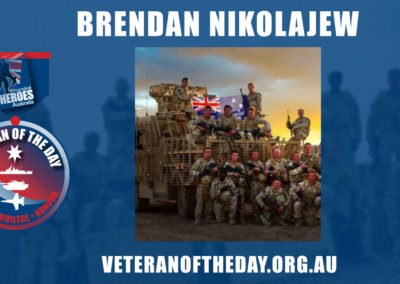
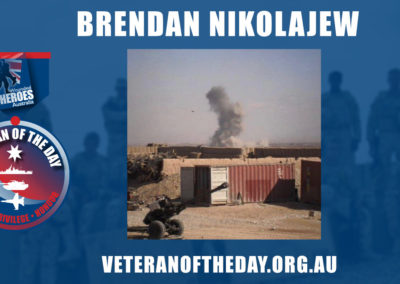
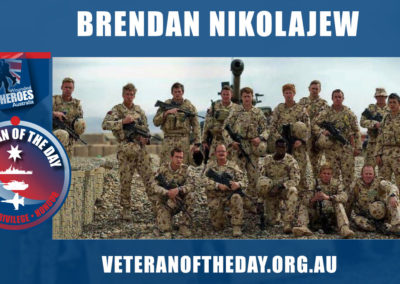
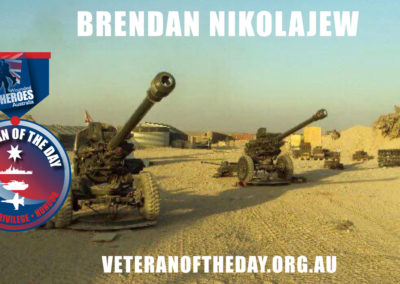




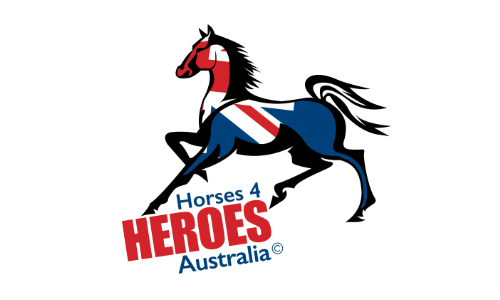
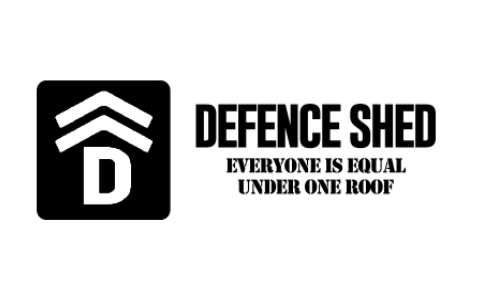
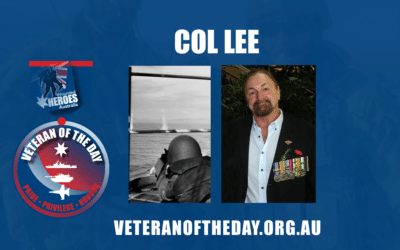
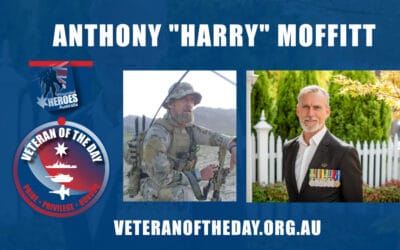
0 Comments